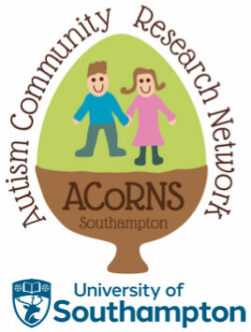ACoRNS Testimonials
“Digital Stories are now one of the ways we show a child’s interests and development to other professionals and parents. Each one is unique and never ceases to amaze and delight its audience. Practitioners are often noting things that have not been noticed during room observations, which expands our knowledge and understanding of the child. It is an important piece of evidence which shows research impacting practice immediately.”
Kathryn Ivil, Manager – Aviary Nursery, Eastleigh
Stephanie Lewis is a trainee Educational Psychologist at the University of Southampton. Her Doctoral research is being carried out with staff, students and families at Hill House School in Hampshire, which is a residential special school that supports autistic children and young people within complex needs. The project aims to adapt and extend the ‘I am..’ Digital Story methodology for young people transitioning from the school, post-19. Steph and the team at Hill House are currently working with three young people from the School to co-create Digital Stories, as well as their care staff and other professionals. Semi-structured interviews with key stakeholders are used to evaluate the perspectives, experiences and views of the Digital Storytelling methodology and its use within transition meetings.
Here, Deputy headteacher Louisa Burden and Speech and Language Therapist Kirsty Marsden talk about the impact of using the Digital Story methodology with students at Hill House School:
These quotes from Steph’s research also illustrate how transformative the Digital Stories methodology has been for staff working with the young people:
“It isn’t a story we have created, it is their story. It is showing what they enjoy doing, showing off the things they can do, all the things that create the fabric of who they are. That is what is missing from the normal transition process”
Care Manager
“it’s a very sort of innovative, creative way to show people differently really. A move away from being this one dimensional kind of written report and showing a bit more of a 360 degree view of somebody”
Social Worker
“we got lots of benefits from seeing the story because we can advocate for [the student] and we can get ideas for activities and strategies. As I said before having the paperwork and also the story, you are able to compare and see how you can actually provide the strategy to the new team”
Speech and Language Therapist
ACoRNS mentions

ACoRNS research included in the AET’s Good Practice Guide
ACoRNS is mentioned in the Case Studies document and the Practitioner Guide, along with our paper in Good Autism Practice that summarises the ACoRNS collaborative model for connecting research and practice. Previous research by Sarah Parsons and colleagues is also cited in the main Good Practice Guide.

Links with ACoRNS mentioned in two outstanding Ofsted reports
Involvement in ACoRNS has been referenced in two Ofsted reports for New Forest School in 2017and Hill House School in 2020, both graded ‘Outstanding’.
The report for New Forest School states ‘Excellent links with Southampton University ensure that the latest academic research about supporting pupils who have autistic spectrum disorder is put into practice. As a result, successful strategies are introduced so that pupils are increasingly well supported.’
The report for Hill House School states ‘They seek advice from beyond the school…liaising with other local experts and carrying out research through their link with Southampton University. This enhances the school’s work considerably’.

ACoRNS mentioned in British Psychological Society blog post
ACoRNS has been mentioned in a blog post written by Dr Abigail Wright for the British Psychological Society to mark children’s mental health week.
In the article, Abigail talks about the work that ACoRNS has conducted on using video technology to capture the voices of young autistic children (Digital Stories).
